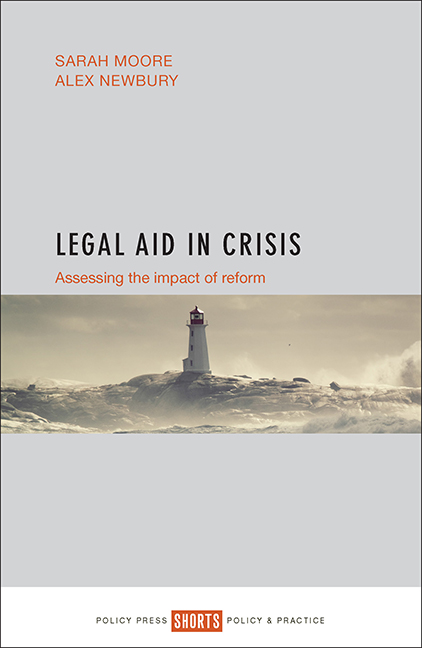Book contents
- Frontmatter
- Dedication
- Contents
- List of abbreviations
- Acknowledgements
- 1 Legal aid in crisis
- 2 Legal aid reform in historical and international perspective
- 3 Assessing the consequences of legal aid reform in England and Wales
- 4 Towards a holistic conception of legal aid
- 5 Refocusing the debate about legal aid
- List of statutes
- References
- Index
4 - Towards a holistic conception of legal aid
Published online by Cambridge University Press: 05 April 2022
- Frontmatter
- Dedication
- Contents
- List of abbreviations
- Acknowledgements
- 1 Legal aid in crisis
- 2 Legal aid reform in historical and international perspective
- 3 Assessing the consequences of legal aid reform in England and Wales
- 4 Towards a holistic conception of legal aid
- 5 Refocusing the debate about legal aid
- List of statutes
- References
- Index
Summary
The previous chapter examined the evidence on the impact of the recent reforms to legal aid. We argued there that policy debate and research has focused almost entirely on the decline of publicly funded legal representation and its impact on courtroom proceedings. The cuts to civil legal advice and assistance have received very little attention, with the notable exception of the Low Commission's (2014; 2015) recent reports on social welfare law. This gap is particularly surprising given that, on closer inspection, it is pre-litigation support that has been most affected by the cuts. The most recent statistics released by the Ministry of Justice and Legal Aid Agency (2016a) reveal that funding for civil legal help is at two thirds of its pre- Legal Aid, Sentencing and Punishment of Offenders Act 2012 (LASPO) level, while funding for civil legal representation has declined by a more modest third. Thus, in this chapter we argue that a more holistic conception of legal aid is needed, one that takes account of the role of legal help and the experiences of litigants. This, in turn, will allow us to arrive at a better understanding of the impact of recent reform.
To this end, the first half of this chapter examines the role of the solicitor in giving advice and assistance, with a particular emphasis on the family lawyer, although many of these issues may in fact equally apply to legal aid lawyers more broadly. We compare the solicitor's role with that of the mediator – not, to be clear, to suggest that this form of support is inherently better or worse, but rather to give a clearer sense of what has been lost with the cuts to legal help. Without legal advice, disputants are liable to be left feeling deeply frustrated and overwhelmed. The absence of this advice risks transforming the law into nothing more than a brute edifice, comprehensible to those with power and status, and utterly unassailable to those without. Thus, in assessing the value of legal advice, this chapter suggests the importance of a litigant-focused perspective.
The role and value of legal advice and assistance
In Chapter Two we noted that there was a shift during the mid-1980s in the way legal aid came to be discussed, both in public debate and policy documents.
- Type
- Chapter
- Information
- Legal Aid in CrisisAssessing the Impact of Reform, pp. 57 - 68Publisher: Bristol University PressPrint publication year: 2017



